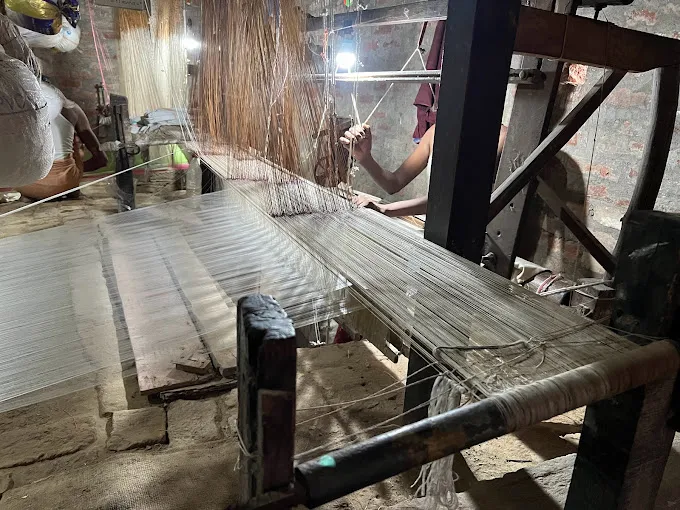Banarasi sarees are special to every Indian woman. These sarees have a long-standing cultural significance and are known for their intricate weaving and elaborate designs.
From classic motifs to contemporary patterns, Banarasi sarees come in a wide range of Banarasi styles complementing every personality and occasion.
In this blog, we will explore the fascinating patterns of Banarasi sarees, from the timeless classics to modern adaptations.
[Read Evolution Of Banarasi Saree Weaving And Handcrafting Practices]
Evolution of Banarasi Saree Patterns over the Years
Over the years, Banarasi saree patterns have evolved and adapted to changing fashion trends while still preserving their traditional essence.
The evolution of these patterns is a testament to the creative ingenuity of Banarasi weavers and their ability to cater to the evolving tastes of saree enthusiasts. Let's explore how some of these patterns have transformed over time:
Classic Patterns with Modern Touches
The classic patterns of Banarasi sarees, such as butidar, and jangla, have been passed down through generations. However, weavers have introduced modern touches to these patterns to make them more appealing to contemporary fashion sensibilities.
For instance, motifs in classic patterns have become larger, bolder, and more stylized. Weavers have experimented with colour combinations, using unconventional shades to give a fresh twist to traditional designs. These adaptations have allowed Banarasi sarees to remain relevant and sought-after in the modern era.
[Know Popular Styles Of Handwoven Banarasi Saree Among Youngsters]
Fusion of Patterns
One notable evolution in Banarasi saree patterns is the fusion of different styles. Weavers have started combining elements from various classic patterns to create unique and innovative designs such as Jangla buti style from classic Jangla and Buti styles. Such combinations add a new dimension to the saree, appealing to those who appreciate a fusion of traditional aesthetics.
Contemporary Interpretations
As fashion trends continue to evolve, Banarasi saree patterns have also embraced contemporary influences. Weavers have incorporated modern motifs, such as abstract art, geometric designs, and nature-inspired patterns, into Banarasi sarees.
These contemporary interpretations add a fresh and trendy appeal to the sarees, making them more versatile and appealing to a wider audience.
Experimentation with Fabrics and Colours
In addition to evolving patterns, Banarasi sarees have witnessed experimentation with fabrics and colours. Traditionally, Banarasi sarees were woven using silk and gold or silver zari threads.
However, weavers have now started using a mix of fabrics like chiffon, georgette, and organza to create a fusion look.
These lighter fabrics allow for drapes that are more comfortable and suitable for various occasions.
Furthermore, weavers have also introduced a wider range of colours, including pastels, earthy tones, and vibrant shades, catering to the diverse preferences of modern buyers.
[Know What Are Trendy Colour Combinations in Banarasi Saree?]
Classic Patterns
Butidar
These motifs are woven with golden or silver zari threads, creating a mesmerizing effect. The butidar saree is a lavish variant of the Banaras saree with an extremely traditional pattern and motif of design that has gained considerable local popularity. The butidar pattern is timeless and elegant, making it a popular choice for weddings and other formal occasions.
Jangla
The Jangla pattern Banarasi is characterized by intricate and densely woven floral or paisley motifs. The motifs are typically arranged in a diagonal or trellis-like pattern, giving the saree a captivating and regal look. The Jangla pattern is often seen in bridal Banarasi sarees, adding to their grandeur and sophistication.
Tanchoi
Tanchoi designs feature extremely elaborate patterns that are interlaced in satin weave using multiple colours. This smooth texture of the saree is what makes it unique. Also, in this method, both warp and weft include silk threads.
The Tanchoi pattern is a perfect blend of traditional and contemporary aesthetics, making it a popular choice among saree enthusiasts.
[Read Discover The Banarasi Sarees Suitable For Casual Wear]
Brocade Patterns
Shikargah
The Shikargah Banarasi pattern features intricate depictions of animals, birds, and hunting scenes and is inspired by Mughal art. The motifs are woven with threads of gold or silver, giving them an opulent and regal appearance.
Banarasi sarees with shikargah patterns are incredibly popular due to their regal and classic appeal. These sarees are ideal for formal occasions and other settings where you want to stand out.
Meenakari
Enameling is used in the Meenakari, a traditional art form that is performed on metal. Meenakari's work is incorporated into Banarasi sarees to produce vivid and intricate patterns using different coloured threads.
Meenakari designs frequently incorporate floral motifs, birds, or geometric patterns, giving the saree a touch of refinement and opulence. Women who love intricate patterns and value traditional arts will adore these sarees.
Contemporary Patterns
Whether you choose an abstract design, a minimalist pattern, or a fusion of styles, a contemporary Banarasi saree will undoubtedly make a stylish statement and reflect the ever-evolving world of fashion.
Floral Motifs
While floral motifs have always been a part of Banarasi sarees, modern adaptations feature larger and bolder floral designs. These designs often incorporate a mix of traditional and contemporary elements, offering a fresh and stylish look.
Floral patterns in vibrant colours can instantly uplift the saree and make it suitable for various occasions. These sarees are perfect for women who love to experiment with different styles.
Geometric Patterns
Modern Banarasi saree designs are increasingly incorporating geometric patterns. The traditional saree is given a contemporary and edgy touch by the patterns, which frequently include geometric shapes, lines, or abstract motifs.
Banarasi sarees with geometric patterns are ideal for those who value a fusion of traditional and modern aesthetics. For formal occasions and occasions where you want to stand out, these sarees are ideal.
Digital Prints
With advancements in textile technology, digital printing has made its way into Banarasi saree designs. Digital prints allow for intricate and detailed patterns that are not limited by traditional weaving techniques.
From floral motifs to geometric designs, digital prints offer a wide range of possibilities, allowing for creativity and experimentation in Banarasi saree patterns.
Minimalist Patterns
Minimalism has become a popular trend in fashion, and Banarasi sarees are no exception. Minimalist patterns feature clean lines, simple shapes, and subtle detailing.
These sarees emphasize elegance and sophistication through their understated designs, making them suitable for both casual and formal occasions.
[Know The Flawless Fusion Of Zari Art and Banarasi Brocade]
Final Thoughts
Banarasi sarees are available in a range of captivating patterns, from timeless classics to modern adaptations. These sarees beautifully blend tradition with contemporary designs, catering to the diverse preferences of saree enthusiasts.
Whether you prefer the intricate butidar and jangla patterns or opt for the grandeur of shikargah and meenakari motifs, there is a Banarasi saree pattern that will undoubtedly captivate your heart and make you feel like a true epitome of elegance and grace. If you are looking for modern and trendy Banarasi saree patterns you can contact Albeli, they are the famous manufacturer of Banarasi silk sarees for the last 3 decades. You can also visit their Banarasi saree shop in Varanasi.






Comments
Leave A Comment: